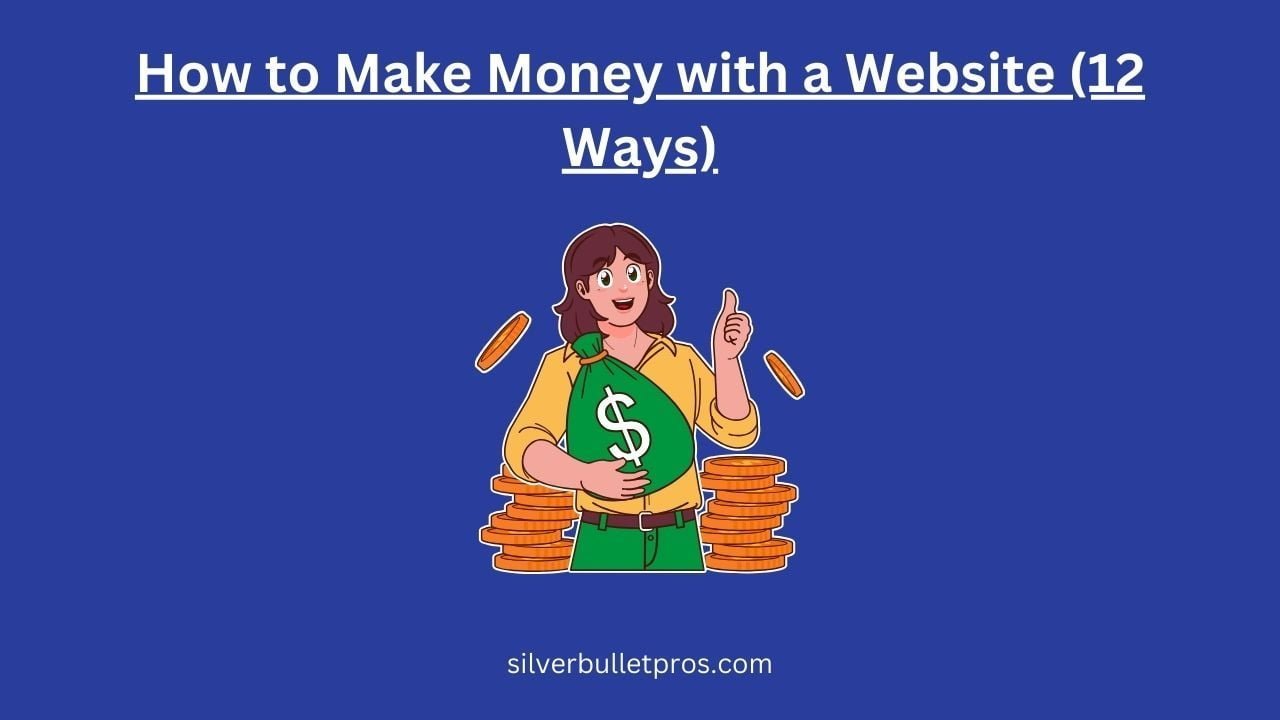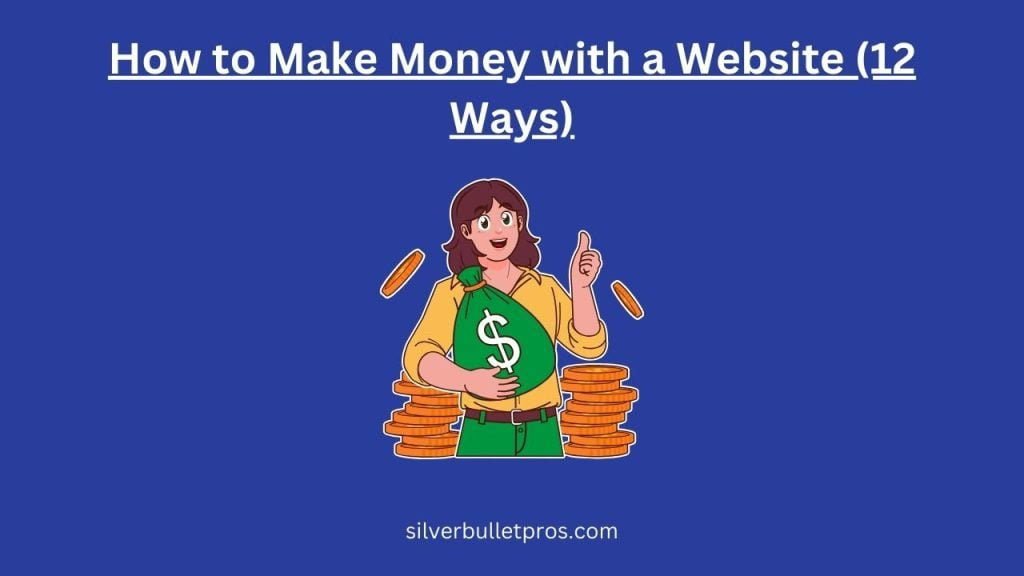

In today's digital age, having a website isn't just about sharing your passion or ideas with the world—it's also a powerful tool for generating income. Whether you're a seasoned webmaster or just starting out, there are countless opportunities to monetize your website and turn it into a lucrative venture. In this comprehensive guide, I'll walk you through 12 proven strategies for making money with your website, from affiliate marketing to freelancing. So, let's dive in and discover how you can start earning money online today!
1. Affiliate Marketing
Affiliate marketing is like being a modern-day matchmaker, connecting eager customers with the products or services they desire. As an affiliate marketer, you'll partner with companies and promote their offerings on your website. Every time someone makes a purchase through your unique affiliate link, you earn a commission. With the right niche and audience targeting, affiliate marketing can be a highly lucrative income stream. For example, if you run a cooking blog, you could partner with kitchenware brands and earn commissions for every pot and pan sold through your site.
2. Google AdSense
Google AdSense is a straightforward way to monetize your website through display advertising. By signing up for AdSense, you can place targeted ads on your site, and you'll earn money whenever visitors click on those ads. The key to success with AdSense is to optimize your ad placements and choose high-paying keywords to maximize your earnings. Additionally, focusing on increasing your website's traffic can directly impact your AdSense revenue, as more visitors mean more ad clicks.
3. Selling Your Own Products or Services
Why promote someone else's products when you can sell your own? Whether you're a talented artist, a skilled craftsman, or a savvy entrepreneur with a unique service to offer, selling your own products or services directly through your website can be incredibly profitable. From handmade jewelry to digital downloads, the possibilities are endless. By cutting out the middleman, you'll retain full control over your pricing, branding, and customer experience.
4. Sponsored Content
Sponsored content, also known as native advertising, involves partnering with brands to create promotional content that seamlessly integrates with your website's existing content. This could include sponsored blog posts, product reviews, or social media shoutouts. Sponsored content allows brands to reach your audience in a more authentic and engaging way while providing you with a steady stream of income. Just be sure to disclose any sponsored content transparently to maintain your audience's trust.
5. Online Courses
If you have valuable knowledge or expertise to share, why not package it into an online course and sell it on your website? Online courses are in high demand, especially in niche markets where people are eager to learn new skills or improve existing ones. Whether you're teaching photography, coding, or yoga, creating and selling online courses can be a lucrative source of passive income. Platforms like Teachable and Udemy make it easy to create, market, and sell your courses online.
6. Membership Sites
Membership sites offer exclusive content, resources, or community access to paying members. By creating a membership site on your website, you can monetize your expertise and build a loyal community of followers. Whether you offer premium articles, downloadable resources, or access to live webinars, membership sites provide recurring revenue through subscription fees. Just be sure to consistently deliver value to your members to keep them engaged and subscribed.
7. Software-as-a-Service (SaaS)
If you have a knack for software development, creating and selling software-as-a-service (SaaS) products can be a highly profitable venture. Whether it's a productivity tool, a project management platform, or a social media analytics dashboard, businesses and individuals are willing to pay for software that solves their problems and improves their workflow. By offering your SaaS product through your website, you can reach a global audience and generate recurring revenue through subscription plans.
8. Digital Products
Digital products are any products that can be downloaded or accessed online, such as ebooks, templates, stock photos, or music tracks. By creating and selling digital products on your website, you can leverage your expertise and creativity to generate passive income. Unlike physical products, digital products require minimal overhead and can be sold an unlimited number of times, making them an attractive option for online entrepreneurs.
9. Consulting Services
If you're a subject matter expert in your field, why not offer consulting services through your website? Whether you're a business coach, a marketing strategist, or a financial advisor, there are countless professionals and businesses in need of your expertise. By offering one-on-one consulting services, you can monetize your knowledge and help others achieve their goals. Just be sure to clearly define your services, set competitive rates, and showcase your expertise through testimonials and case studies.
10. Donations
Believe it or not, some people are willing to support your work simply because they believe in what you're doing. By adding a donation button or link to your website, you can give your audience the opportunity to show their appreciation and support financially. Whether it's through one-time donations or recurring contributions, donations can provide a valuable source of income for content creators, bloggers, and nonprofits alike.
11. Advertising
In addition to Google AdSense, there are other advertising networks and platforms that allow you to monetize your website through display advertising. By partnering with ad networks like Media.net or BuySellAds, you can access a wider range of advertisers and potentially earn higher ad revenue. Just be mindful of the user experience and avoid overwhelming your audience with too many ads, as this can detract from the quality of your content.
12. Freelancing
Last but not least, don't overlook the opportunity to use your website as a portfolio or storefront for your freelance services. Whether you're a graphic designer, a writer, or a web developer, showcasing your work and skills on your website can attract potential clients and projects. By offering your services directly through your website, you can cut out the middleman and retain full control over your freelance business.
What are the most effective monetization strategies for websites?
Some effective strategies include display advertising, affiliate marketing, sponsored content, e-commerce, and subscriptions or membership models.
How can I drive more traffic to my website to increase revenue?
Optimize your website for search engines (SEO), leverage social media marketing, explore paid advertising channels like Google Ads or social media ads, and create high-quality, shareable content.
What types of websites are most profitable in the current market?
E-commerce websites, content-based websites (blogs, news sites), software-as-a-service (SaaS) platforms, and niche websites catering to specific interests or industries tend to be highly profitable.
How do I build an email list and leverage it for monetization?
Offer incentives (like free resources or discounts) for visitors to subscribe to your email list, and then promote relevant products, services, or sponsored content to your engaged email subscribers.
What are the key metrics I should track to measure my website's profitability?
Track website traffic (unique visitors, page views), conversion rates (sales, leads, subscriptions), revenue sources (advertising, affiliate marketing, e-commerce), and customer acquisition costs.